Why There Are No Organs in Japanese Baseball
And Why the Game is Completely Different
When each new Major League Baseball season starts, Japanese baseball in turn starts. I write this as I sit at home watching the Yakult Swallows vs. the Hiroshima Carp. This morning it was LA vs Atlanta. You gotta love the timezones where you can watch both and still get your work done. Although I do not support the Los Angeles Dodgers, it’s hard not to turn into their games every day. They are the rock stars of baseball, led by the biggest rock star the game has ever seen in Shohei Ohtani. This is not an Otani post by the way, but he is a once-in-a-lifetime player who embodies the very best of both Japanese and American baseball. He represents the disciplined, team-first mentality of Japanese baseball while thriving in the power-driven spectacle of the big league in America. In Japan, he is a national hero, inspiring young players to dream bigger. In America, he is proof that baseball’s future belongs to those who can master every aspect of the game. Ohtani has shown us that greatness transcends borders.
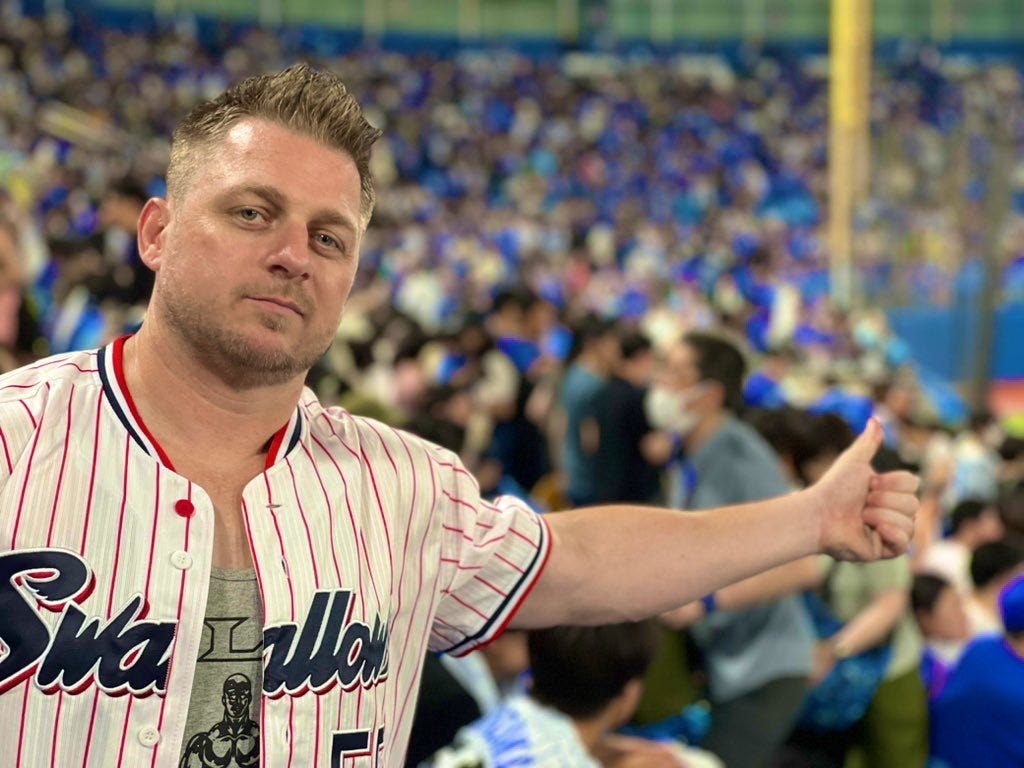
So when I start watching at the beginning of each season, I always remember just how completely different the game is here in Japan to the American game. Before I write on…
A nod to Robert Whiting
I am no professional baseball writer. I’ll leave that to my literary hero, Robert Whiting. His books, You Gotta Have Wa, The Meaning of Ichiro, and The Samurai Way of Baseball, capture the nuances of Japanese baseball better than anyone else ever could. If you really want to understand how Japan took America’s pastime and made it uniquely its own, his work is a must-read. Here we are watching a Yakult Swallows game. The guy next to him might be asleep.
The first thing to remember
Baseball is baseball… right? Well, yes and no. Here, the game is called yakyu (野球 = field ball). Sure, it’s technically the same sport. Nine innings, three outs, home runs, strikeouts and what have you. But everything else about it feels like an entirely different world and you can say that about many things in Japan, professional wrestling (which I know a thing or two about - more on this later) right up there at the top of the list. From the atmosphere in the stands at Japanese ball games, to the way the game is played on the field, Japanese baseball isn’t just American baseball with a language switch. It’s its own unique beast.
No organs (just drums and chants)
One of the first things you notice at a Japanese baseball game is the lack of organ music. In America, the ballpark organ is a staple, filling the downtime with quirky little riffs and classic baseball tunes. But in Japan? No need. The fans bring the music themselves. Personally I would prefer to have both. The Japanese cheering is amazing, but baseball is not the same without the organ playing.
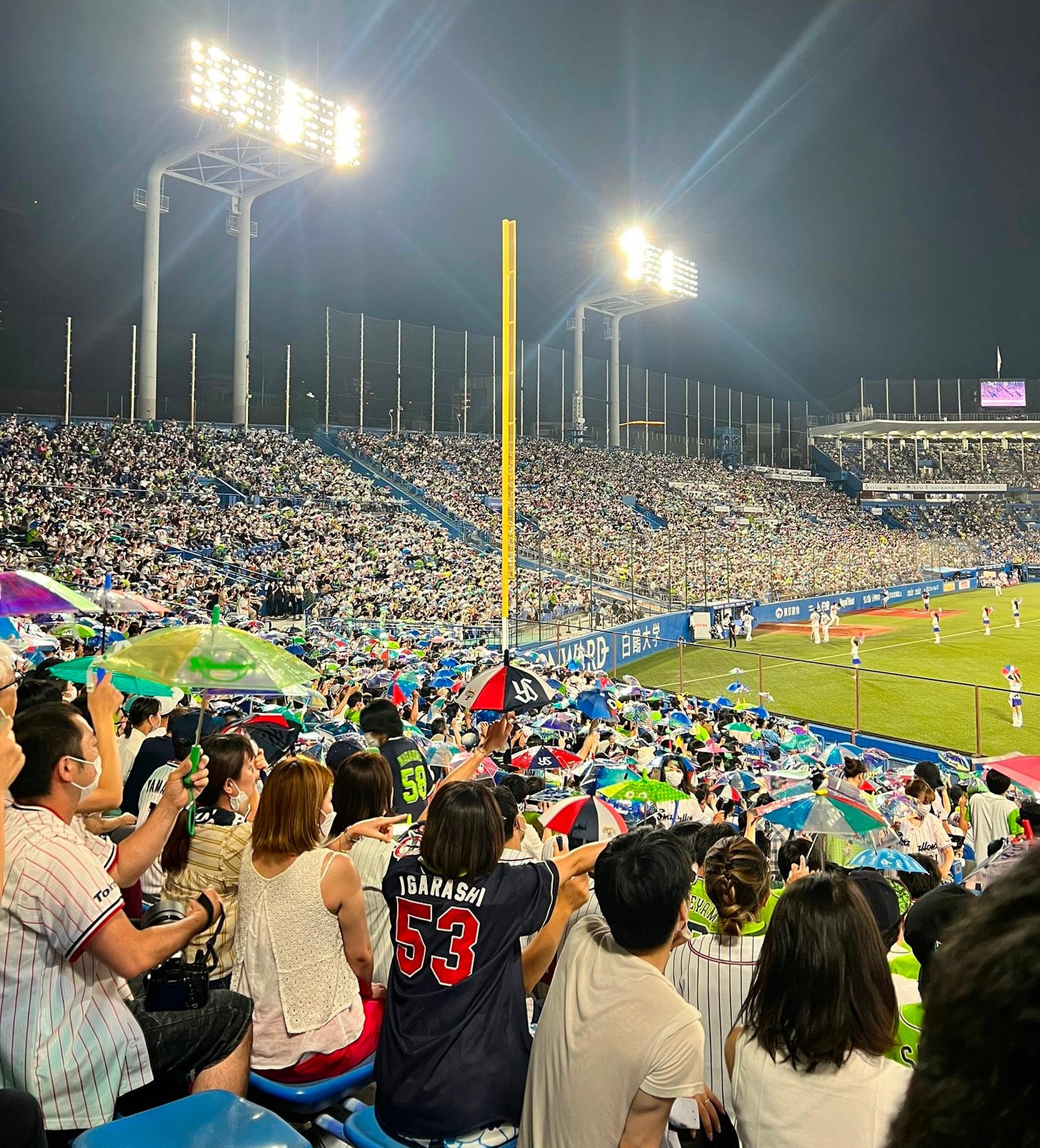
Each team has an Ōendan, a dedicated cheering squad that leads the entire stadium in coordinated chants, drum beats, and brass band performances. Every player has a specific song, and the fans know exactly when and how to sing it. There’s no downtime and certainly no time for some organ music to be played. Instead, you get a stadium that sounds more like a soccer match than a baseball game, with relentless energy from the first pitch to the last out. The organised cheering just never stops, and the home team fans and away team fans take coordinated turns to cheer.
When you think of American baseball, certain things immediately come to mind. Beer, hot dogs, and the sound of the ballpark organ echoing through the stadium. There’s a nostalgia to it, a connection to the past that makes MLB games feel like a slice of Americana. The organ isn’t just background noise but rather it’s part of the soul of the game. From "Take Me Out to the Ball Game" to "Charge!" and even "Baby Shark" in recent years, the music sets the tone for a leisurely day at the ballpark. It’s about the spectacle, the history, and the larger-than-life moments that define baseball in the United States. Check out this from the St. Louis Cardinals organ player Jermey Boyer. Just brilliant and the crowd loves it.
More methodical, more strategic, and waaaaaaaay longer
Japanese baseball games tend to last way longer than their MLB counterparts. It’s not just about extra innings, which are capped in Japan. It’s the style of play. MLB thrives on big moments. Home runs, strikeouts, and highlight-reel plays. Japanese baseball, on the other hand, is built on small-ball tactics, discipline, and an almost obsessive focus on the fundamentals.
Which brings me to the sacrifice bunt. I will never truly understand the Japanese love for the sacrifice bunt.
In MLB, bunting is mostly dead unless you’re in a desperate situation. But in Japan, teams will lay down a sac bunt in the third inning just to advance a runner. Even superstar hitters will bunt if the manager calls for it. It’s all part of the philosophy of playing for the team rather than personal stats, but to a Western baseball fan, it can be absolutely mind-boggling. I only understand it because I understand the Japanese way of thinking (although that doesn’t make it right).
And then there’s the catchers. Japanese catchers love to give elaborate, almost theatrical hand signals to their pitchers. In the MLB, a catcher might flash a few quick signs. In Japan, some catchers look like they’re auditioning for a role in a mime troupe, with exaggerated hand gestures and intricate movements that make you wonder if they’re actually throwing in some coded messages about where to eat after the game.
The Japanese spin on all American things
This “same but completely different” approach isn’t just unique to baseball. It’s the same with professional wrestling (amongst many other things).
Pro wrestling (puroresu) was brought to Japan after World War II as a way to boost morale, with Rikidozan defeating larger American wrestlers, giving Japan a symbol of strength during a difficult time. But just like baseball, Japan took the imported concept and completely redefined it. While American pro wrestling evolved into a more entertainment-driven spectacle, Japanese wrestling became more hard-hitting, grounded in realism, and treated almost like a combat sport. This was because all of Japan’s original professional wrestlers all came from legit combat sport backgrounds (sumo, judo, wrestling). Without Japanese professional wrestling, there is no modern day MMA. I will argue that until the day I die.
Baseball in Japan follows that same pattern. It’s not just about winning or losing. It’s about how you play the game. Respect for tradition, team-first mentality, and a methodical approach make it very different from the power and money driven, show-stopping nature of MLB.
So while the rules of the game might be the same (the ball sizes are different), the experience couldn’t be more different. No organs, no lazy innings, no quick strikeouts and home runs. Just disciplined, strategic baseball played in a way that only Japan could do.
Rionne McAvoy is the director of the award-winning documentary The One's Left Behind: The Plight of Single Mothers in Japan, showcasing his dedication to addressing pressing social issues. A committed documentary filmmaker and professional wrestler, he explores critical themes with passion and insight. Additionally, he has a keen interest in post-World War II Japan, particularly the intricate connections between politicians and gangsters during that era. Known in the wrestling ring as Rionne Fujiwara, he brings the same determination and storytelling prowess from his wrestling persona to his filmmaking endeavors.


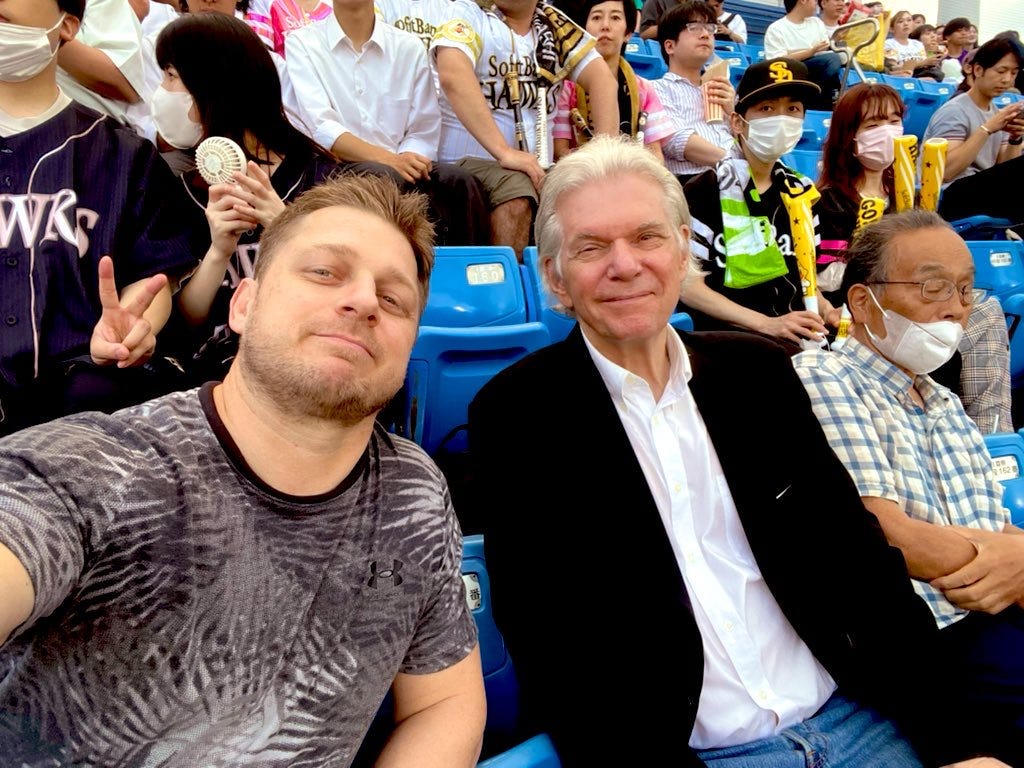
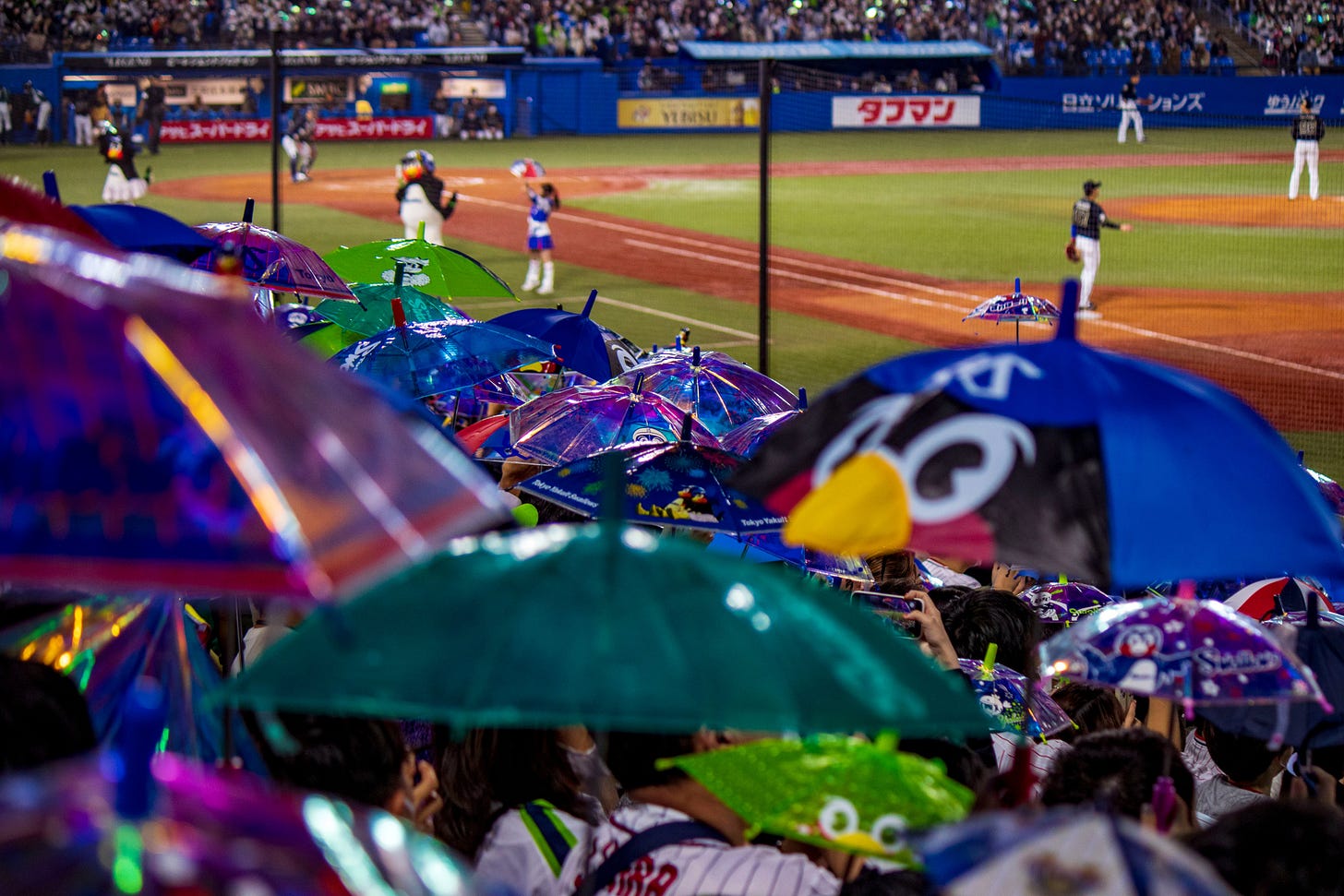
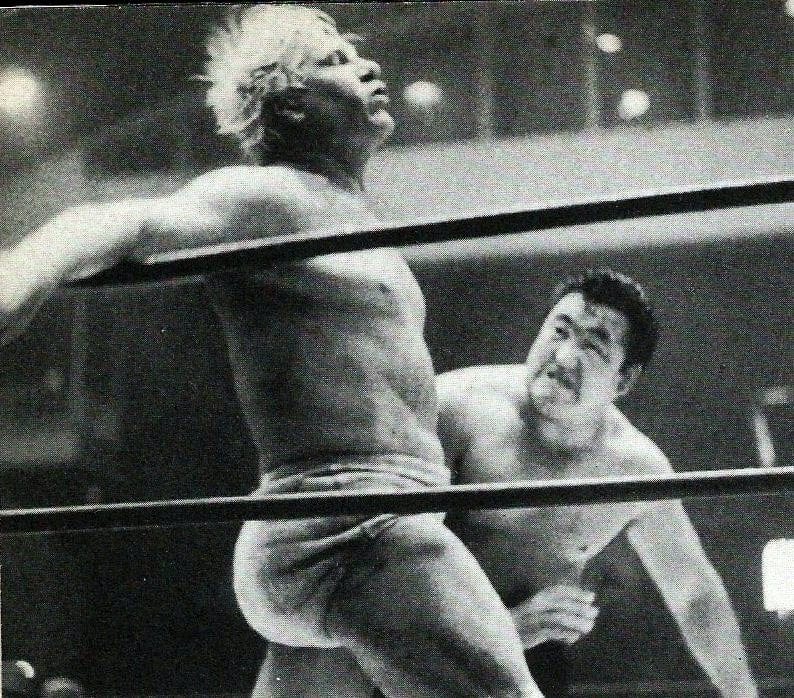
As a Carp fan I did not enjoy watching today's game on TV so much :-( but shoganai
I have to say I prefer watching live in the stadium even when my team loses, I've had plenty of fun at Jingu too in the past. I've sat near the carp Ōendan a couple of times. It's exhausting ... but fun.